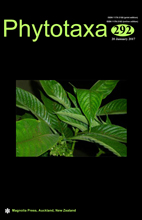Abstract
The monospecific genus Ambrosina is represented by Ambrosina bassii, an endemic species of western-central Mediterranean mainly studied in Sicily and Corsica. The objectives of this study were to establish the distribution of this species and to determine its habitat and ecology in Tunisia. Moreover, the infraspecific diversity from recent and old collections throughout its range is characterized. The analyses of 8 leaf traits not considered by previous authors uncovered four of the five varieties reported in this species and complete their morphological description. The soil and climate conditions favorable to their development (bio-climate, rainfall, elevation, pH, texture, assets and total limestone content of the soil) are determined. Three varieties are widely distributed in all of the species’ range, but A. bassii var. angustifolia appears actually to be rare with a very restricted distribution in Algeria.

